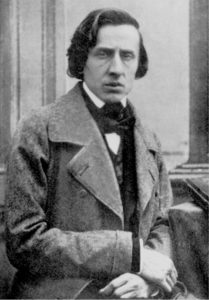
He lived from 1810 to 1849, but Frédéric Chopin is still amazing from the pianist’s — and the patron’s — perspective. In fact, it seems he is ever-more celebrated as the years go on. His appeal as a Romantic era composer is very widespread among audiences and pianists.
Chopin appeals to audiences…and to performers
All of the audience appeal I wrote about in “Why Audiences Love Chopin” apply, but for a performer, it is all that and more. As we study the score, we continually see how amazing Chopin was at composing (particularly for the piano, as he wrote almost exclusively for said instrument). We can see or conjecture the purpose of each note, creating our own story that we tell the audience. In doing so, there are many considerations performers have to keep in mind in order to keep the music tasteful and exciting.
For pianists, Chopin demands many considerations
I think that one of the most difficult things for a pianist to do in Chopin is to create distinct sounds. Many pianists rely on general musicality and instincts and let Chopin’s writing do the work for them (I’ve been guilty of this several times). Chopin’s works are masterpieces, and they deserve the analysis and effort befitting of their status.
- How do I differentiate this section from another?
- How can I bring out the character of the piece and tell a story worth listening to?
- How much rubato is too much?
These are questions I need to ask myself when I study any composer, and particularly Chopin. His works generally fall comfortably under the hand (not that they are without difficulty, just really well-composed for the piano), and it is really easy to just take advantage of that by letting things flow with little actual in-depth study of the score.
Chopin’s lyricism is famous, so of course the pianist needs to pay extra close attention to this during practice. The rich sounds and harmonies sometimes work against us, muffling the melody, which requires meticulous care and practice to prevent.
The challenges of playing Chopin are offset by the joy
These considerations and more plague the pianist in our study of Chopin’s masterpieces, but they only amplify our love and appreciation for his music. His compositions are among the best for expressing and venting out melancholy and drama in a rather beautiful, elegant way.
There are others who have much to say about Chopin’s appeal. An article in WQXR “Why Pianists Love Chopin,” is well worth the time for its answers from pianists to questions regarding their love for Chopin.